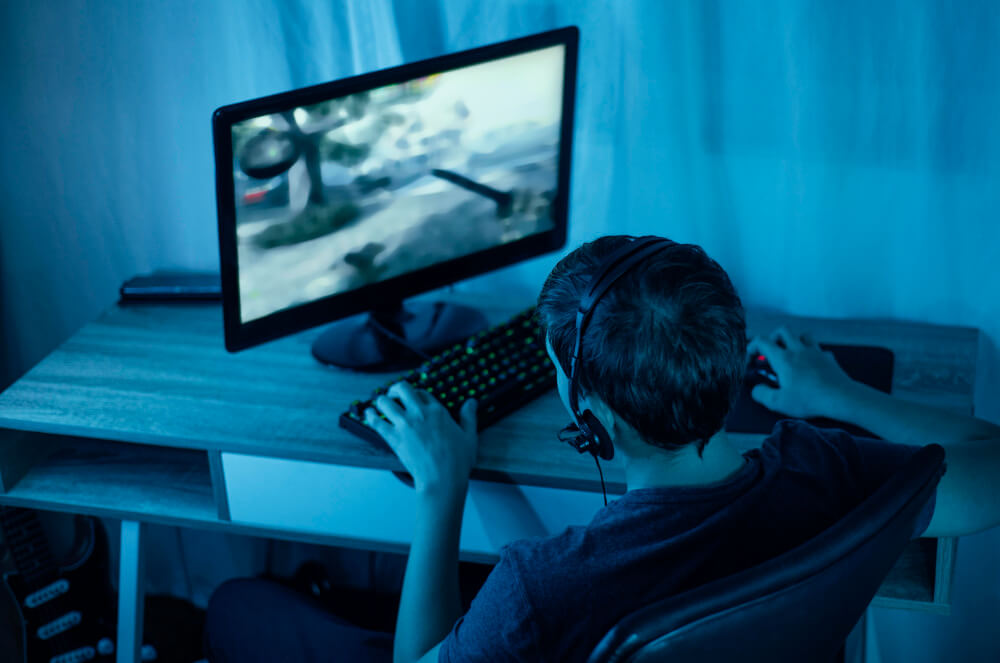– Updated on May 22, 2025
Hundreds of plaintiffs have filed video game addiction lawsuits, holding video game developers and publishers liable for creating addictive content.
Below, we detail what you need to know about legal actions related to internet gaming disorder (IGD).
What Is Internet Gaming Disorder?
IGD is a condition recognized by the World Health Organization and defined in the 11th Revision of the International Classification of Diseases (ICD-11). Per the ICD-11, internet gaming disorder is characterized by:
- A lack of control over gaming
- Prioritizing gaming over activities and interests
- Continuing to game despite clear negative consequences
Doctors can identify a gaming disorder by looking for a behavior pattern that significantly impairs a person’s ability to function in certain areas, such as family relationships and friendships, education, or job performance.
Who Are the Defendants in Internet Gaming Disorder Legal Actions?
As of August 2024, the defendants in internet gaming disorder lawsuits include video game developers and publishers. As more lawsuits are filed, more defendants, such as app stores, publishers, and companies that create and implement microtransactions, could be identified and held liable.
Is Your Family Struggling with Internet Gaming Disorder?
What Are These Gaming Addiction Lawsuits Claiming?
These lawsuits allege that the online game developers intentionally created games that fostered addictive behaviors in an effort to ensure an ongoing customer base. They also allege that they targeted vulnerable users (kids) with specific ingrained elements, including:
- Reward systems: Developers create reward systems within games that are often unpredictable. The variable nature of these schedules can cause high excitement and serotonin hits. The serotonin hits these reward systems cause can keep players gaming for hours.
- Loot boxes and other microtransactions: Loot boxes are a type of microtransaction in which gamers purchase a mystery box that they can later redeem for a weapon or other tool. These purchases mimic gambling and can cause addictive gameplay patterns and encourage unhealthy gaming behavior.
- Grinding: Many games require repeatedly performing the same task to get experience points, level up, or earn rewards. This can cause a child to continue online gaming for hours at a time.
- FOMO: FOMO, or Fear of Missing Out, can cause severe anxiety in tweens and teens. A child or teen’s fear of missing out on something everyone else is doing, especially something exclusive or time-limited, can urge players to keep coming back and stay on longer.
- Login bonuses/rewards for playing each day: Many games offer rewards or bonuses, like loot boxes or experience points, that can compel players to return every day.
- Dynamic difficulty adjustment algorithms: Many games adjust their difficulty in real-time, depending on the player’s ability level. These fresh updates can keep kids online gaming for hours.
Online video games also have a social element that can be incredibly addictive for children and teens. Serotonin hits can also be very addictive, mainly because it can be challenging to reach that same “high.” Kids and teens may spend more time playing to reach that high.
Have Any Legal Actions for Gaming Disorder Been Successful?
As of August 2024, no video game addiction lawsuits have been successful. One was dismissed, but it appears that the dismissal was from a plaintiff error.
The cases still need to be consolidated into multidistrict litigation. In June 2024, the plaintiffs requested consolidation, but the court refused, stating a “lack of common factual questions.”
Have the Defendants Responded to These Gaming Disorder Lawsuits?
The defendants have claimed that these lawsuits are a violation of the creators’ First Amendment rights, citing a 2011 Supreme Court decision that held that video games, like other media, cannot be regulated for violent imagery. The creators allege that because you cannot sue a TV show creator or author for addictive content, you cannot sue a video game creator for the same.
Is Your Family Struggling with Internet Gaming Disorder?
Could I Qualify for an Internet Gaming Disorder Lawsuit?
You may be able to file a video game addiction lawsuit if your child’s excessive video game use led to them being diagnosed with IGD or gaming addiction. You could also have a valid case if you can establish one or more of the following occurred due to your child’s excessive gaming and behavioral addiction. Your child:
- Was diagnosed with Attention-Deficit/Hyperactivity Disorder (ADD/ADHD) or Oppositional Defiant Disorder (ODD)
- Is displaying signs of depression or anxiety
- Is suffering from sleep deprivation psychosis
- Is suffering from computer vision syndrome
- Is very irritable or displaying signs of Gamer Rage or aggression
- Requires an Individualized Education Plan (IEP) or 504 Plan at school
- Dropped out of school
- They need to be homeschooled
- Has brain changes that are demonstrable on CT scans or MRIs
- Suffered an orthopedic injury, such as gamer’s thumb (de Quervain’s tenosynovitis), trigger finger, carpal tunnel syndrome, tennis elbow, or neck sprain/herniation
- Suffers from gaming-induced seizures
- Has lost income because they are unable to work full-time
- They still live at home because they are unable to support themselves
- Has a criminal record related to their addiction (e.g., a misdemeanor or felony conviction for theft, burglary, or robbery)
- Is obese
- Has high blood pressure (hypertension)
- Is severely neglecting personal hygiene to game
- Is prioritizing gaming over sports or other hobbies
- Is socially withdrawing (not making friends or losing friends) from daily activities
- Is demonstrating changes in their eating patterns
- Is cursing excessively or in inappropriate settings
Is your child suffering serious adverse effects after playing Roblox, Call of Duty, Fortnite, Grand Theft Auto, or Minecraft for hours every day? You might be entitled to compensation.
Our Team Can Help You With an Internet Gaming Disorder Legal Action
If your child’s excessive gaming has caused them to develop mental health issues or lose career opportunities, you may be entitled to compensation. The Goldwater Law Firm team wants to help you hold the video game creators liable for the pain and anguish they have caused you and your family.
Call today to get connected with a video game addiction lawsuit lawyer in your area.

The Goldwater Law Firm is on mission to help as many people as possible with the fierce, compassionate legal aid only The Gold Standard of Injury Law can offer. If you suffered serious side effects or were diagnosed with an illness because of a defective drug or product, or if you were injured in an accident that wasn’t your fault, Attorney Bob Goldwater and the Goldwater Law Firm is ready to serve as your compassionate partner in the fight to seek the compensation and justice you deserve.
Share this post:



